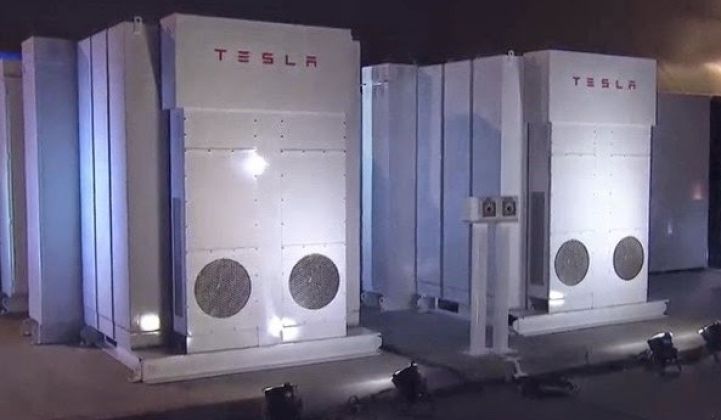A promise by Tesla to solve an ongoing Australian energy crisis with battery storage has prompted calls for similar plans worldwide.
Twitter users from nations including Argentina, Chile, South Africa, Thailand and Turkey clamored for battery mega-projects after Tesla pledged to build a 100 megawatt-hour-plus plant in Australia within 100 days of signing a contract -- or let the Australians have it for free.
One of the more notable Twitter requests came from Ukrainian Prime Minister Volodymyr Groysman. “Ukraine is eager to become a test site for innovation,” he said. “Let's talk it over in details [sic].”
The outpouring of enthusiasm for energy storage came after Lyndon Rive, the head of Tesla's energy division (and former CEO of SolarCity), promised to solve Australia’s energy problems following blackouts in South Australia.
Rive said Tesla would be able to install between 100 and 300 megawatt-hours of batteries, enough to meet 15 percent of total energy demand in South Australia, within 100 days, thanks to increased production capacity at Tesla’s Gigafactory in the U.S.
Rive made the pledge at the launch of Tesla’s Powerwall 2 and Powerpack 2 battery systems in Newport, Melbourne.
It was reported by the Australian Financial Review and prompted Australian software tycoon Mike Cannon-Brookes to send Elon Musk, Tesla’s CEO, a tweet asking if the offer was a serious one.
“Tesla will get the system installed and working 100 days from contract signature or it is free,” Musk responded. “That serious enough for you?”
Cannon-Brookes asked for a week “to try sort out politics & funding [sic],” but within a day Musk had already spoken on the phone with South Australia Premier Jay Weatherill. A telephone conversation with Australian Prime Minister Malcolm Turnbull came two days later.
Speaking via Twitter, Turnbull thanked Musk for “a great in depth discussion today about energy storage and it’s role in delivering affordable & reliable electricity [sic]."
Weatherill, meanwhile, promised to spend AUD $500 million (USD $386 million) on Australia’s largest battery storage and gas-fired plant, with 100 megawatts of storage.
It remains unclear whether Tesla will build the project, which has a budget of AUD $150 million (USD $116 million). Musk said his batteries would cost $250 per kilowatt-hour of installed capacity “at the pack level” for systems of 100 megawatt-hours or more.
Musk did not clarify whether the pricing was in U.S. or Australian dollars. Either way, the exchange focused attention on the use of energy storage to solve a problem that has become a rancorous political issue in Australia.
In recent months, South Australia has been racked by frequent blackouts that Turnbull originally blamed on the state’s high dependence on renewable energy, and particularly wind power.
It subsequently emerged that the Prime Minister and other officials from his party had issued misleading statements about the true cause of the first major blackout, which the Australian Energy Market Operator (AEMO) said was not a fault of the generation mix.
The first blackout, in September of last year, prompted calls for an increase in energy storage. But in October, a senior figure from Australian utility ActewAGL Distribution told GTM that battery storage was “many years away” from being able to deal with the problem.
Giw Zanganeh, managing director of the Lugano, Switzerland-based compressed air energy storage technology developer ALACAES, raised doubts over the financial viability of battery storage at the scale needed to solve Australia’s grid problems.
“Consider that the $250 per kilowatt-hour that Musk offers is only the battery pack,” he said. “The complete system is a factor of two to three times more expensive, depending on the power-capacity ratio, and the whole capacity is never exploited, to increase lifetime.”
In any event, Australian lawmakers need to find a solution to the country’s grid challenges soon because AEMO has warned of further difficulties ahead.
“A projected decline in gas production could result in a shortfall of gas-powered electricity generation impacting New South Wales, Victoria and South Australia from the summer of 2018-19,” said the operator in a statement this month.
Tesla’s case for using batteries to help South Australia is strengthened by the company’s 80-megawatt-hour storage system installed in California last year. The system was designed to replace capacity lost from the Aliso Canyon natural gas store -- and it only took only 88 days to build and commission.
Whether or not Australia signs a deal with Tesla, the publicity is already enough to get other countries thinking seriously about large-scale battery storage.
Despite the financials, said Zanganeh: “I think Musk's initiative is a great marketing move and that we will see many more such projects in the future.”



